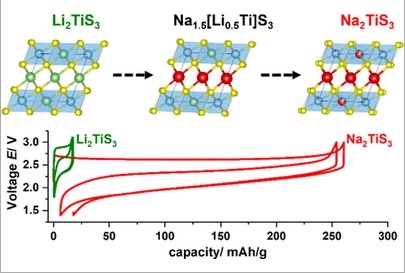Ask for a reprint
email :
* Give your email
2022
ACL
|
B.T.Leube, E.Salager, E.Chesneau, G.Rousse, H.Vezin, A.M.Abakumov, J-M.Tarascon, 'The layered sodium titanium trichalcogenide Na2TiCh3 framework (Ch= S, Se): A rich crystal and electrochemical chemistry.', Chem. Mat. 34 2382-2392 (2022) doi:10.1021/acs.chemmater.1c04374
The synthesis and characterization of novel alkaline-rich transition-metal chalcogenides is an intriguing task for solid-state chemists and battery researchers. This class of materials allures by its rich compositional variety, high theoretical capacities, and sometimes surprising electrochemistry. Using electrochemically inactive O3-type Li2TiS3 as a starting point, we embark on the synthesis and electrochemical characterization of five novel chalcogenides: Na2TiS3, Na2TiSe3, Na2ZrS3, Na2ZrSe3, and finally Na1.5[Li0.5Ti]S3. All compounds crystallize in the layered O3 structure type but show different electrochemical activities. In particular, Na2TiS3 proves to be an interesting cathode material: the exchange of Li for Na unlocks electrochemical activity and allows for sustained electrochemical cycling of up to 1.8 Na per formula unit. We elucidate the structural evolution of the NaxTiS3 framework during cycling and find a reversible structural transformation from O3 to O1 stacking of the TiS3 octahedral layers. These findings could help understand the origin of anionic redox activity in the materials based on d0 transition metals while opening another direction toward cathode materials comprising solely abundant elements.
|

|